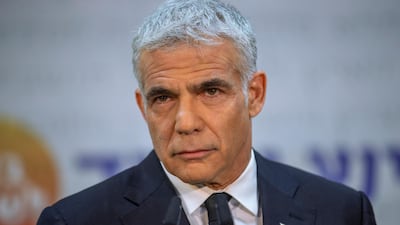Before pursuing a political career in 2012, Yair Lapid was a well-known media personality, first as a print journalist and later as a talk-show host on Israeli TV.
Now Mr Lapid stands to become one of the most powerful men in Israel’s government after building a coalition with Naftali Bennett.
With Mr Bennett in the first rotation as Prime Minister, Mr Lapid is set to take over in two years' time.
The two men and their supporters, including the first Palestinian-Israeli party to hold a position in an Israeli government, have made history by ending former prime minister Benjamin Netanyahu’s 12-year reign.
Mr Netanyahu's political demise came after a period of turmoil that involved four elections in two years.
Mr Lapid is considered to be a secular centrist, and is taking yet another significant step in his political career by visiting the UAE as the first Israeli Foreign Minister to do so.
His party, Yesh Atid, now holds 17 seats in Israel's parliament, making it the largest in the new coalition.
In contrast to Mr Bennett’s support for Israeli settlements, Mr Lapid is the seemingly more moderate voice in the country's leadership.
He supports a two-state solution and has denounced Mr Netanyahu’s “populist” and “extremist” government, in which Mr Bennett once served as finance minister.
Some of Mr Lapid’s other critiques of Mr Netanyahu’s government focused on his handling of the coronavirus pandemic.
“Israel did well in terms of bringing the [coronavirus] vaccine, but did terribly bad on everything else,” Mr Lapid said in a March interview with the Washington Institute for Near East Policy think tank.
On the international front, Mr Lapid hopes to position Israel as a bipartisan ally in the US, as opposed to Mr Netanyahu's pro-Republican ties that strengthened under former US president Donald Trump's term.
“I’m going to do much better work making sure Israel goes back to being a bipartisan issue in the United States,” Mr Lapid said at a Brookings Institution event in February.
Days before his UAE visit, Mr Lapid met US Secretary of State Antony Blinken and Bahrain’s Foreign Minister Abdullatif Al Zayani in Rome.
“In the past few years, mistakes were made,” Mr Lapid told Mr Blinken during the visit. “Israel’s bipartisan standing was hurt. We will fix those mistakes together.”
He also repeated his belief in diplomacy and "direct and professional conversation" as a means to iron out disagreements as opposed to press conferences.
Mr Lapid holds the same position that Israel has long-held towards Iran. He has publically opposed the talks in Vienna between the US and Iran that aim to restore the Joint Comprehensive Plan of Action – the 2015 Iran nuclear deal.
The US withdrew from the agreement in 2018 under Mr Trump’s presidency.
However, with Palestinians protesting against their own government and Gaza reeling from the 11-day war that killed hundreds and obliterated much of its infrastructure, it remains to be seen how influential Mr Lapid will be.


